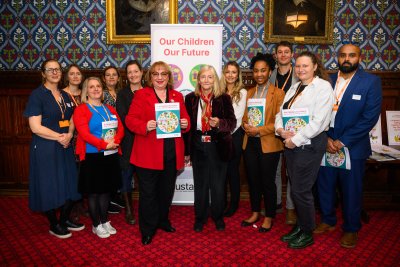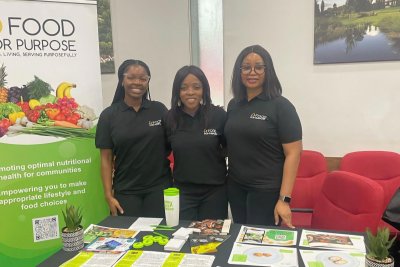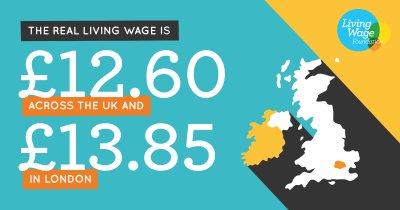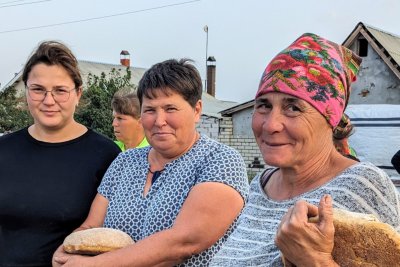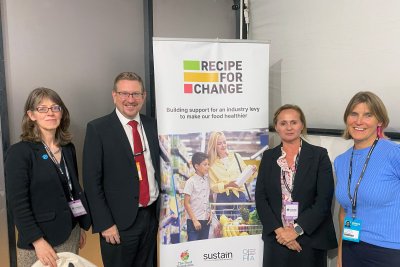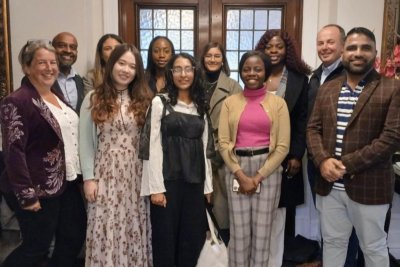 Diversity of people. Credit: Alan Karlik / Sustain
Diversity of people. Credit: Alan Karlik / Sustain
Five ways to raise our game on diversity and racial justice
As communicators, policy specialists and campaigners, we in the environment and sustainability movement need to apply our creativity to promote positive action for diversity and racial justice, says Kath Dalmeny, Chief Executive of Sustain.
Recently, I joined the heads of Wildlife & Countryside Link, The Wildlife Trusts and The Green Alliance in calling for greater action on ethnic diversity in our movement. Our sector remains worryingly behind on achieving ethnically diverse leadership and staff teams that would help us all make better decisions, better represent the global majority, and challenge the injustices that are structurally embedded in food, farming, land and the environment.
In this blog, I suggest five ways in which we could collectively make significant strides to improve the prospects for people from diverse ethnic and socio-demographic backgrounds employed in the environment and sustainability movement. I don’t want to give the impression that I think Sustain is leading on these matters; we are taking mere baby steps. But our movement is awash with talent in communications, policy development and campaigning. Let’s apply the privilege of these skills, resources and access to the public and policy-makers with renewed enthusiasm and creativity, to significantly raise our game.
Transparency
The environment, climate, sustainability and conservation sector is one of the least diverse in the country in terms of leadership and employees. ONS data shows that the average rate of employment in all professions for people identifying as from Black, Asian and minority ethnic backgrounds is over 12%. Yet in the environment and conservation sectors, it is shockingly low, at between 0% and 4%.
Let’s come clean about this and participate in The RACE Report, collecting data from across our movement, to compare performance, identify gaps and inspire collective action.
Communication
People need to know that they are welcome and see representation of people and situations that are familiar and which they can relate to. We need to make conscious choices of imagery and language that portray diversity in a positive way. Sustain has developed a Diversity Style Guide to help us do this. We’ve also allocated a budget to help overcome barriers to participation, such as offering speaker fees to people who come from less wealthy backgrounds and organisations.
Recruitment
Students Organising for Sustainability (SOS-UK) inspired us to launch an Ethnicity Confident scheme, offering the enhanced chance of gaining an interview to people who meet the essential criteria for jobs and who tell us they want to be considered in this way. In our recruitment, we respect people’s work and life experience, don’t expect degree-level qualifications, show the salary, and don’t ask for people’s previous salary. All of these have been identified as helpful to people from diverse backgrounds.
Job security
Over the past year, prompted by younger staff, IWGB union members and people from diverse backgrounds, we’ve been examining the tricky issue of making jobs in the charity sector more secure. People from diverse and disadvantaged backgrounds often cannot afford to take the risks associated with the types of short-term and fixed-term contracts common in our sector and find it harder to secure essential rental agreements, loans and mortgages. This is a significant structural challenge to overcome for a sector reliant on public donations and short-term, project-based charitable grants or contracts. Let’s start an honest conversation about how to do so.
Fair pay
How can we expect people from diverse and disadvantaged backgrounds to join our movement if we also expect them to live in poverty and be unable to afford the basics, let alone take the risk of stepping into a new career? Sustain is an accredited Living Wage Employer. Our lowest salaries are well above the real Living Wage, and we expect our suppliers to pay at least the real Living Wage, such as the cleaners and ancillary staff for our office premises.
Meanwhile, cavernous pay gaps create and deepen division, as reported by the High Pay Centre. Sustain commissioned Dr Lindy Sharpe to develop a pay ratio analysis methodology to help us keep our pay gap within sensible bounds. We compare our top salary with the London Living Wage, reporting annually. We have consistently kept within a ratio of 3:1, comparing our top salary with the London Living Wage, well below the average of 8:1 for the charity sector, and several hundreds of times lower than pay ratios common in the private sector.
These are tricky issues for our sector to address, with our organisations and with our supporters and funders. However, in a cost-of-living crisis, and with the ambition to become more ethnically and socio-economically diverse, we have a duty to do so.
Read Sustain’s Progress Report on Diversity and Anti-racism (updated May 2023) and our joint call with WCL, Green Alliance and The Wildlife Trusts, for support for The RACE Report.
Sustain: Sustain The alliance for better food and farming advocates food and agriculture policies and practices that enhance the health and welfare of people and animals, improve the working and living environment, enrich society and culture and promote equity.
Sustain
The Green House
244-254 Cambridge Heath Road
London E2 9DA
020 3559 6777
sustain@sustainweb.org
Sustain advocates food and agriculture policies and practices that enhance the health and welfare of people and animals, improve the working and living environment, promote equity and enrich society and culture.
© Sustain 2024
Registered charity (no. 1018643)
Data privacy & cookies
Icons by Icons8

